CITROEN DS3 CABRIO DAG 2016 Handbook (in English)
Manufacturer: CITROEN, Model Year: 2016, Model line: DS3 CABRIO DAG, Model: CITROEN DS3 CABRIO DAG 2016Pages: 458, PDF Size: 14.51 MB
Page 101 of 458
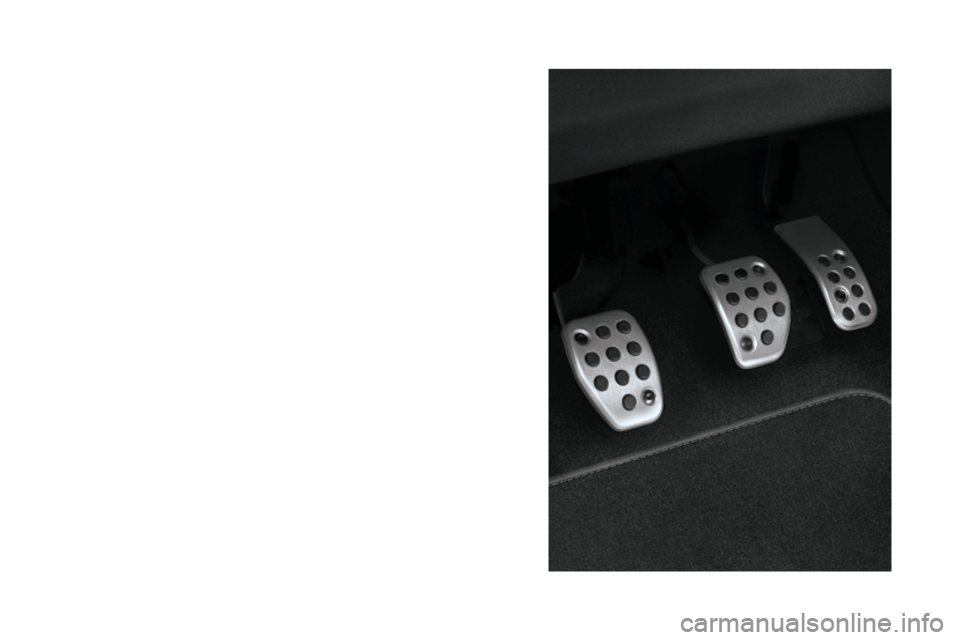
DS3_en_Chap04_conduite_ed01-2015
Page 102 of 458
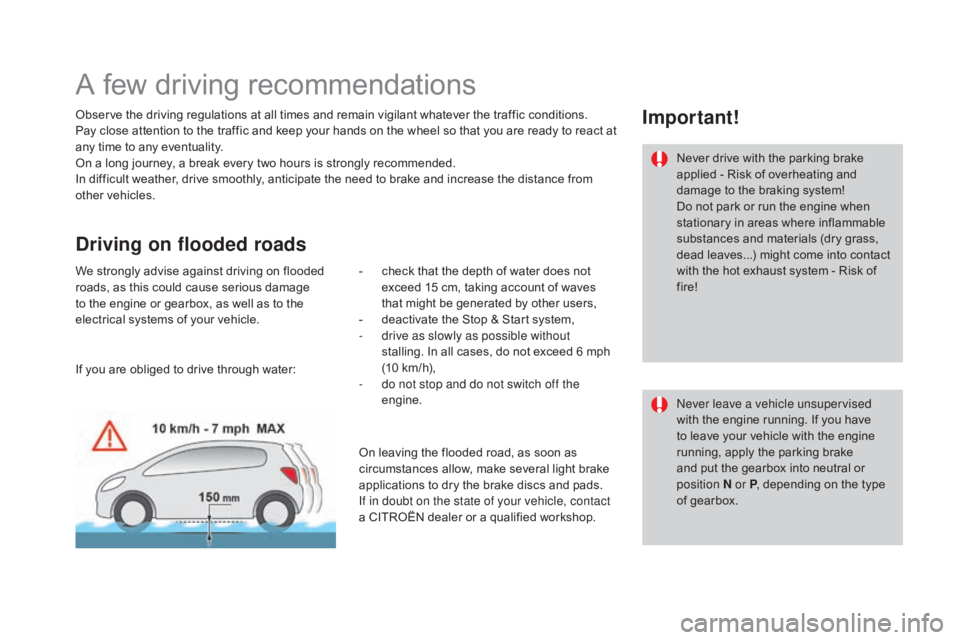
DS3_en_Chap04_conduite_ed01-2015
A few driving recommendations
Observe the driving regulations at all times and remain vigilant whatever the traffic conditions.
P ay close attention to the traffic and keep your hands on the wheel so that you are ready to react at
a
ny time to any eventuality.
On
a long journey, a break every two hours is strongly recommended.
In
difficult weather, drive smoothly, anticipate the need to brake and increase the distance from
o
ther
v
ehicles.
driving on flooded roads
We strongly advise against driving on flooded roads, as this could cause serious damage
t
o the engine or gearbox, as well as to the
e
lectrical systems of your vehicle.
Important!
Never drive with the parking brake applied - Risk of overheating and
d
amage to the braking system!
Do
not park or run the engine when
s
tationary in areas where inflammable
s
ubstances and materials (dry grass,
d
ead leaves...) might come into contact
w
ith the hot exhaust system - Risk of
f
ire!
Never leave a vehicle unsupervised
with
the engine running. If you have
t
o leave your vehicle with the engine
r
unning, apply the parking brake
a
nd put the gearbox into neutral or
p
osition
n or P,
depending on the type
o
f gearbox.
-
c
heck
that
the
depth
of
water
does
not
e
xceed
15
cm,
taking
account
of
waves
t
hat
might
be
generated
by
other
users,
-
d
eactivate
the
Stop
&
Start
system,
-
d
rive as slowly as possible without
stalling.
In
all
cases,
do
not
exceed
6
mph
(
10 km/h),
-
d
o not stop and do not switch off the
engine.
If
you
are
obliged
to
drive
through
water: On
leaving
the
flooded
road,
as
soon
as
c
ircumstances
allow,
make
several
light
brake
a
pplications
to
dry
the
brake
discs
and
pads.
If in doubt on the state of your vehicle, contact
a
CITROËN
dealer
or
a
qualified
workshop.
Page 103 of 458
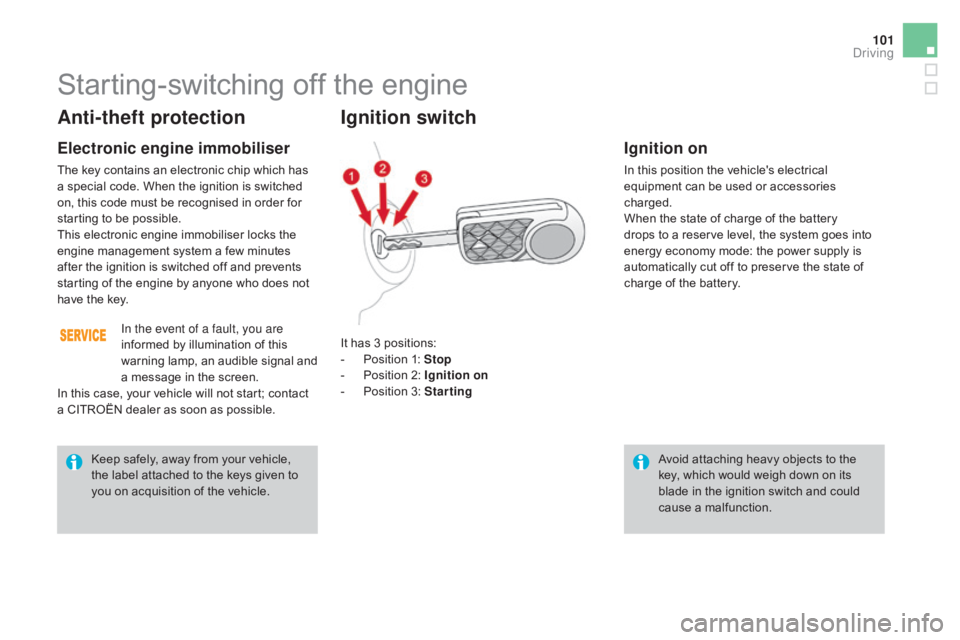
101
DS3_en_Chap04_conduite_ed01-2015
Anti-theft protection
Electronic engine immobiliser
The key contains an electronic chip which has a special code. When the ignition is switched
o
n, this code must be recognised in order for
s
tarting to be possible.
This
electronic engine immobiliser locks the
e
ngine management system a few minutes
a
fter the ignition is switched off and prevents
s
tarting of the engine by anyone who does not
h
ave the key.In the event of a fault, you are
informed
by illumination of this
w
arning lamp, an audible signal and
a
message in the screen.It
has 3 positions:
-
P
osition 1: Stop
-
P
osition 2: Ignition on
-
P
osition 3: Starting
Ignition switch
Ignition on
In this position the vehicle's electrical equipment can be used or accessories
c
harged.
When
the state of charge of the battery
d
rops to a reserve level, the system goes into
e
nergy economy mode: the power supply is
a
utomatically cut off to preserve the state of
c
harge of the battery.
Keep
safely,
away
from
your
vehicle,
t
he
label
attached
to
the
keys
given
to
y
ou
on
acquisition
of
the
vehicle.
Starting-switching off the engine
In this case, your vehicle will not start; contact a CITROËN dealer as soon as possible.
Avoid
attaching heavy objects to the
k
ey, which would weigh down on its
b
lade in the ignition switch and could
c
ause a malfunction.
driving
Page 104 of 458
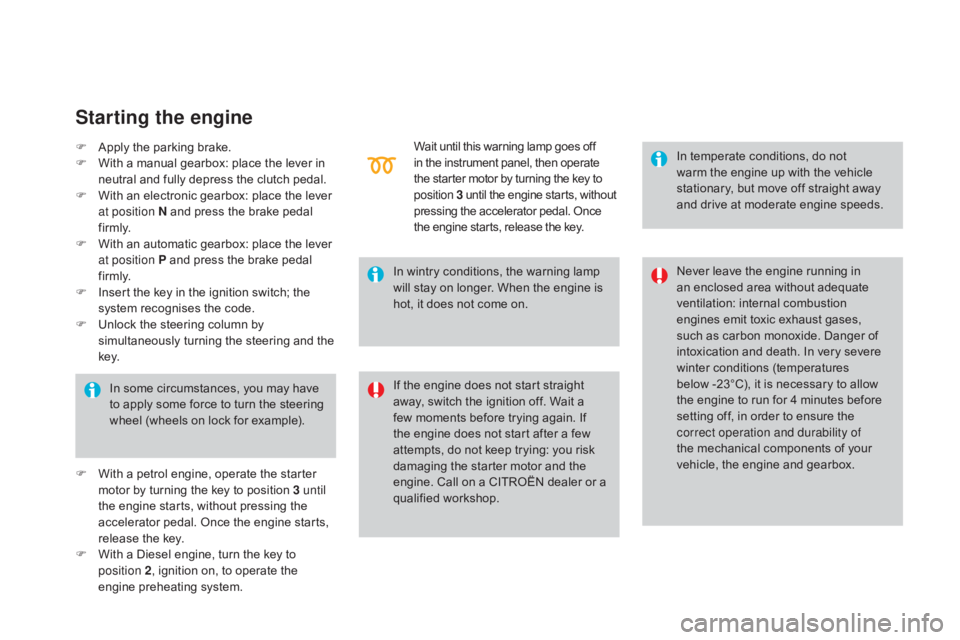
DS3_en_Chap04_conduite_ed01-2015
F Apply the parking brake.
F W ith a manual gearbox: place the lever in
n
eutral and fully depress the clutch pedal.
F
W
ith an electronic gearbox: place the lever
a
t position n and press the brake pedal
f
i r m l y.
F
W
ith an automatic gearbox: place the lever
a
t position P and press the brake pedal
f
i r m l y.
F
I
nsert the key in the ignition switch; the
s
ystem recognises the code.
F
U
nlock the steering column by
s
imultaneously turning the steering and the
k
ey.
Starting the engine
In some circumstances, you may have to apply some force to turn the steering
w
heel (wheels on lock for example).In
wintry conditions, the warning lamp
w
ill stay on longer. When the engine is
h
ot, it does not come on.In temperate conditions, do not
w
arm the engine up with the vehicle
s
tationary, but move off straight away
a
nd drive at moderate engine speeds.
If the engine does not start straight a
way, switch the ignition off. Wait a
f
ew moments before trying again. If
t
he engine does not start after a few
a
ttempts, do not keep trying: you risk
d
amaging the starter motor and the
e
ngine. Call on a CITROËN dealer or a
q
ualified
w
orkshop.Never
leave the engine running in
a
n enclosed area without adequate
v
entilation:
in
ternal
c
ombustion
e
ngines emit toxic exhaust gases,
s
uch as carbon monoxide. Danger of
i
ntoxication and death. In very severe
w
inter conditions (temperatures b
elow -23°C), it is necessary to allow t
he engine to run for 4 minutes before
s
etting off, in order to ensure the
c
orrect operation and durability of
the
mechanical components of your
v
ehicle, the engine and gearbox.
F
W
ith a petrol engine, operate the starter
m
otor by turning the key to position 3 until
the
engine starts, without pressing the
a
ccelerator pedal. Once the engine starts,
r
elease the key.
F
W
ith a Diesel engine, turn the key to
p
osition 2 ,
ignition on, to operate the
eng
ine
p
reheating
s
ystem. Wait
until this warning lamp goes off
i
n the instrument panel, then operate
t
he starter motor by turning the key to
p
osition
3
until the engine starts, without
p
ressing the accelerator pedal. Once
t
he engine starts, release the key.
Page 105 of 458
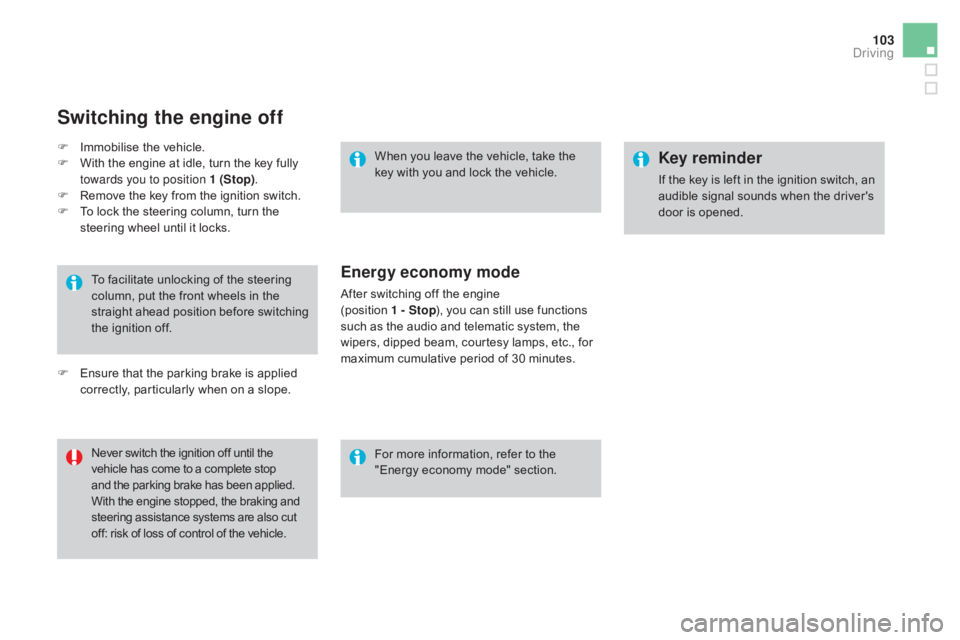
103
DS3_en_Chap04_conduite_ed01-2015
To facilitate unlocking of the steering column, put the front wheels in the
s
traight
a
head
p
osition
b
efore
s
witching
t
he ignition off.
Never
switch the ignition off until the
v
ehicle has come to a complete stop
a
nd the parking brake has been applied.
W
ith the engine stopped, the braking and
s
teering assistance systems are also cut
o
ff: risk of loss of control of the vehicle.When
you leave the vehicle, take the
k
ey with you and lock the vehicle.
For more information, refer to the
"
Energy economy mode" section.
Key reminder
If the key is left in the ignition switch, an audible signal sounds when the driver's
d
oor is opened.
Switching the engine off
F Immobilise the vehicle.
F W ith the engine at idle, turn the key fully
t
owards you to position 1 (Stop) .
F
R
emove the key from the ignition switch.
F
T
o lock the steering column, turn the
s
teering wheel until it locks.
F
E
nsure that the parking brake is applied
c
orrectly, particularly when on a slope.
Energy economy mode
After switching off the engine (position 1
- Stop),
you can still use functions
s
uch as the audio and telematic system, the
w
ipers, dipped beam, courtesy lamps, etc., for
m
aximum cumulative period of 30 minutes.
driving
Page 106 of 458
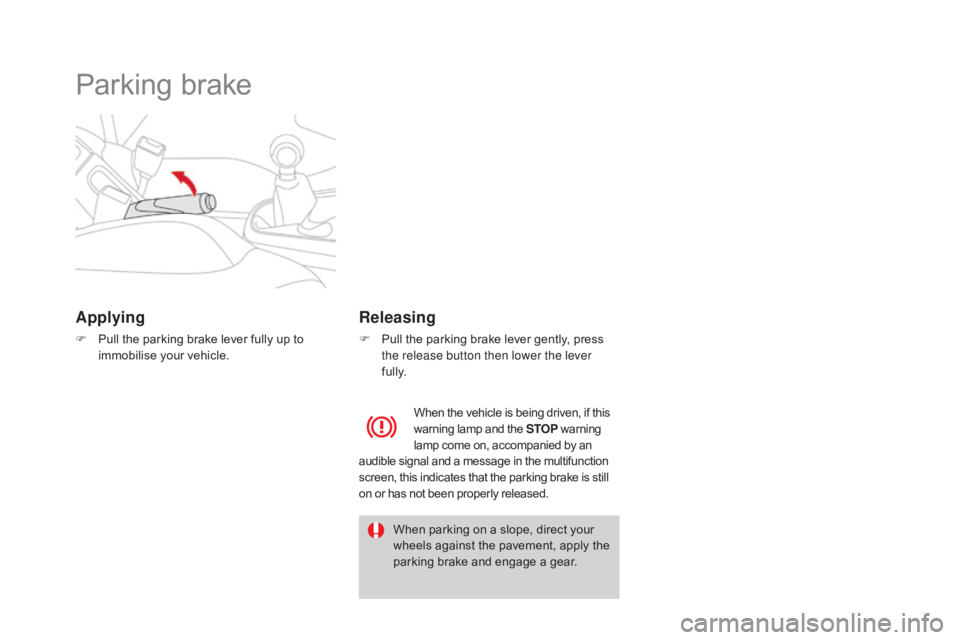
DS3_en_Chap04_conduite_ed01-2015
Parking brake
Applying
F Pull the parking brake lever fully up to i
mmobilise your vehicle.
Releasing
F Pull the parking brake lever gently, press t
he release button then lower the lever
fully.
When
parking on a slope, direct your
w
heels against the pavement, apply the
p
arking brake and engage a gear.
When
the vehicle is being driven, if this
w
arning lamp and the STOP
w
arning
l
amp come on, accompanied by an
a
udible signal and a message in the multifunction
s
creen, this indicates that the parking brake is still
o
n or has not been properly released.
Page 107 of 458
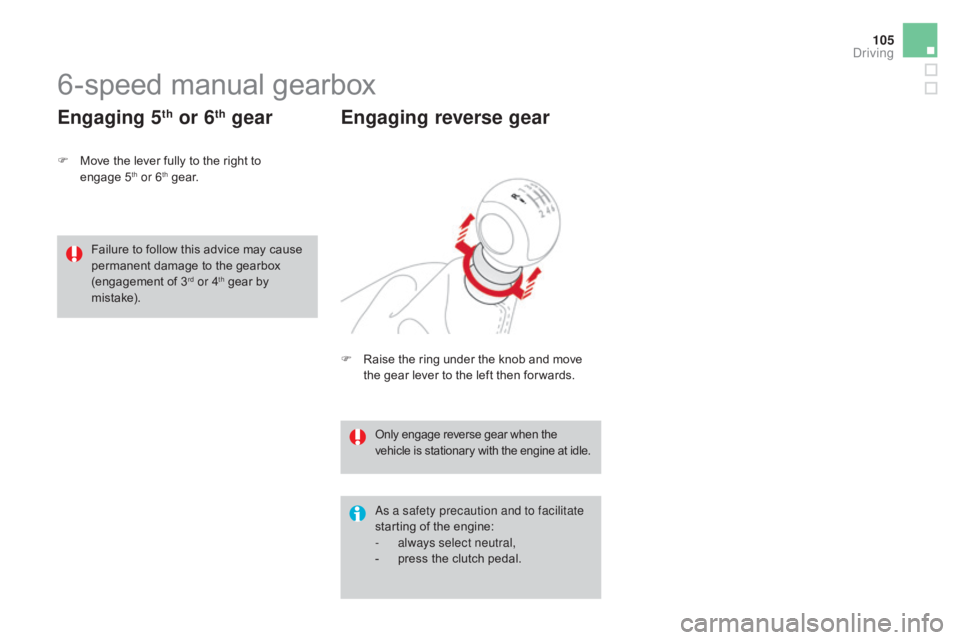
105
DS3_en_Chap04_conduite_ed01-2015
6-speed manual gearbox
F Move the lever fully to the right to enga
ge 5th or 6th ge a r.
Engaging 5th or 6th gear
As a safety precaution and to facilitate
starting of the engine:
-
a
lways select neutral,
-
p
ress the clutch pedal.
Only engage reverse gear when the vehicle is stationary with the engine at idle.
Engaging reverse gear
F Raise the ring under the knob and move t
he gear lever to the left then for wards.
Failure
to
follow
this
advice
may
cause
p
ermanent
damage
to
the
gearbox
(
engagement
o
f
3rd or 4th gear by m
i st a ke).
driving
Page 108 of 458
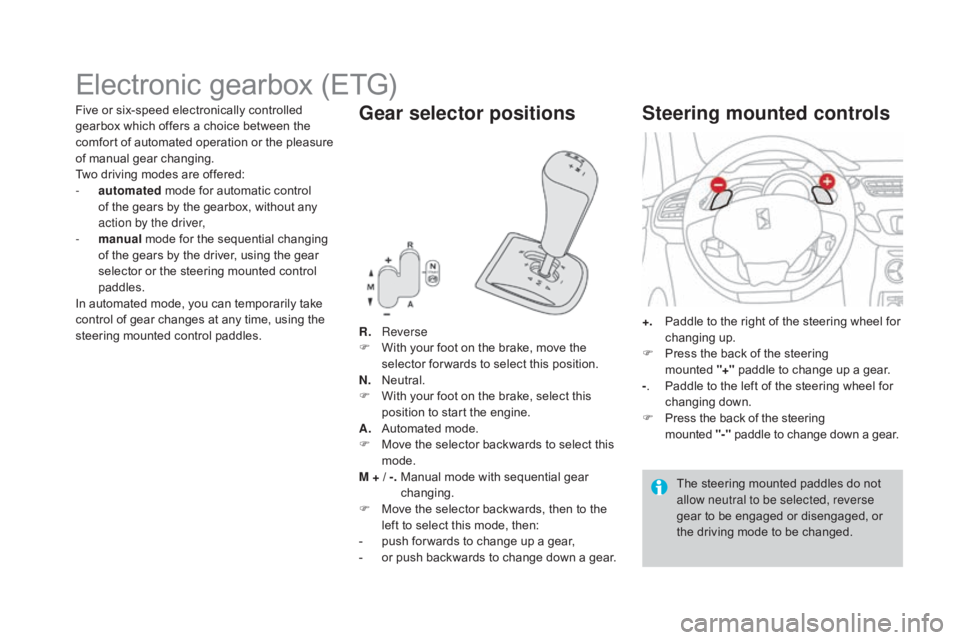
DS3_en_Chap04_conduite_ed01-2015
Electronic gearbox (ETG)
R. Reverse
F W ith your foot on the brake, move the
s
elector for wards to select this position.
n. N
eutral.
F
W
ith your foot on the brake, select this
p
osition to start the engine.
A.
A
utomated mode.
F
M
ove the selector backwards to select this
m
ode.
M + / -.
M
anual mode with sequential gear
c
hanging.
F
M
ove the selector backwards, then to the
l
eft to select this mode, then:
-
p
ush for wards to change up a gear,
-
o
r push backwards to change down a gear.
gear selector positions
+. Paddle to the right of the steering wheel for c
hanging u p.
F
P
ress the back of the steering
m
ounted "+" paddle
to change up a gear.
- .
P
addle to the left of the steering wheel for
c
hanging
d
own.
F
P
ress the back of the steering
m
ounted "-" paddle
to change down a gear.
Steering mounted controls
The steering mounted paddles do not allow neutral to be selected, reverse
gear
to be engaged or disengaged, or
t
he driving mode to be changed.
Five
or
six-speed
electronically
controlled
g
earbox
which
offers
a
choice
between
the
c
omfort
of
automated
operation
or
the
pleasure
o
f
m
anual
g
ear
c
hanging.
Two
driving
modes
are
offered:
-
a
utomated
mode
for
automatic
control
o
f
the
gears
by
the
gearbox,
without
any
a
ction by the driver,
-
m
anual
mode
for
the
sequential
changing
o
f
the
gears
by
the
driver,
using
the
gear
s
elector
or
the
steering
mounted
control
p
addles.
In
automated
mode,
you
can
temporarily
take
c
ontrol
of
gear
changes
at
any
time,
using
the
s
teering
mounted
control
paddles.
Page 109 of 458
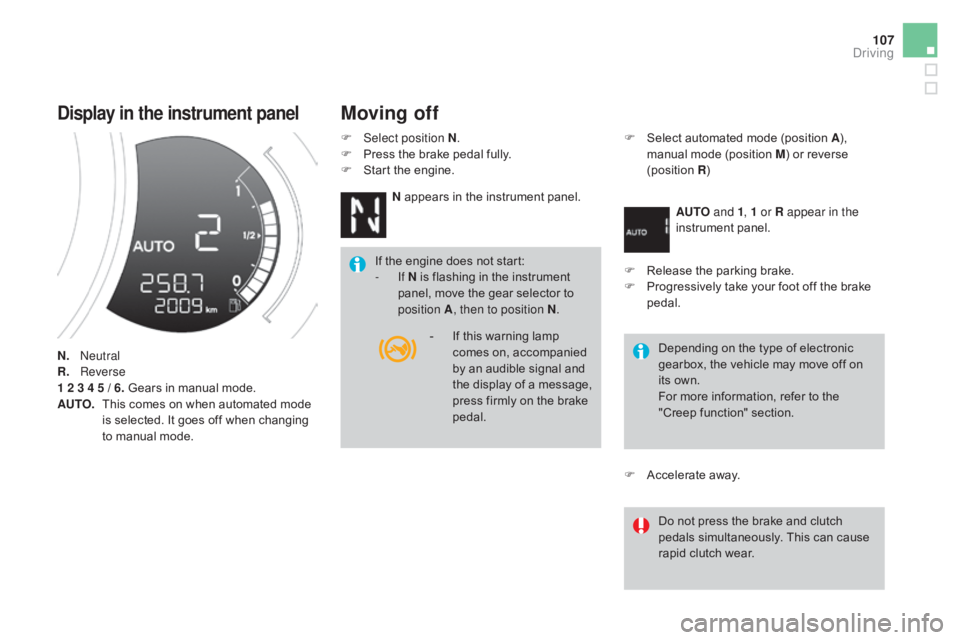
107
DS3_en_Chap04_conduite_ed01-2015
display in the instrument panel
n. Neutral
R. R everse
1 2 3 4 5 / 6.
Gears in manual mode.
AUTO.
T
his comes on when automated mode
i
s selected. It goes off when changing
t
o manual mode.
Moving off
F Select position n.
F P ress the brake pedal fully.
F
S
tart the engine.
n
appears in the instrument panel.
If
the engine does not start:
-
If
n
is flashing in the instrument
p
anel, move the gear selector to
p
osition A, then to position
n
.F
S elect automated mode (position A
), m
anual mode (position M) or reverse
(
position
R)
AU
TO and 1 , 1 or R appear in the
instrument
pan
el.
F
R
elease the parking brake.
F
P
rogressively take your foot off the brake
ped
al.
Depending
on the type of electronic
g
earbox, the vehicle may move off on
i
ts own.
For
more information, refer to the
"
Creep function" section.
Do
not press the brake and clutch
p
edals simultaneously. This can cause
r
apid clutch wear.
F
A
ccelerate away.
-
I
f this warning lamp
c
omes on, accompanied
b
y an audible signal and
t
he
d
isplay
o
f
a
m
essage,
p
ress firmly on the brake
ped
al.
driving
Page 110 of 458

DS3_en_Chap04_conduite_ed01-2015
Creep function
(depending on equipment)
This function allows the vehicle to be
manoeuvred more easily at low speeds (when
p
arking, in traffic jams...).
With
the gear selector in position A, M or R ,
the vehicle moves as soon as you take your
foot off the brake pedal , at low speed and
with
the engine at idle.
Automated mode
AUTO and the gear engaged appear i
n the instrument panel.
The
gearbox then operates in auto-adaptive
m
ode,
without any action on the part of the
d
river.
It
continuously selects the most suitable
g
ear
taking account of:
-
o
ptimisation of fuel consumption,
-
d
riving style,
-
r
oad conditions,
-
v
ehicle load.
For
optimum acceleration, when overtaking
a
nother
vehicle for example, press the
a
ccelerator pedal fully down, beyond the point
of
resistance. You
can change mode at any time by
m
oving the gear selector from A to M or
the
other way round.
The
creep
function
may
be
temporarily
u
navailable
if
the
clutch
temperature
is
t
oo
high
or
the
slope
too
steep.
Do not leave children unsupervised
inside
the
vehicle
when
the
engine
is
r
unning. F
Sel
ect position A
.
Never select neutral (position n
)
when
m
oving.
Temporary control of gear
changing
You can temporarily take over control of gear c hanges using the steering mounted "+" and
"-"
control
paddles: if the engine speed allows, the
g
ear change is carried out.
This function allows you to anticipate certain
situations
s
uch
a
s
ov
ertaking
a
nother
v
ehicle
o
r
a
pproaching a bend.
After
a few moments without any action on the
p
addles, the gearbox resumes control of gear
c
hanging
a
utomatically.